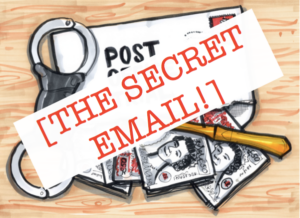Important, tho

Hello secret emailers
Students of the legalistic shenanigans surrounding this story may be interested in a few documents I’ve posted up over the last couple of days.
Two are rulings related to the “contempt” hearing at the Court of Appeal on 3 Dec. I have put the word contempt in inverted commas because the ruling made by Lord Justice Holroyde clearly states that whatever transpired on 3 Dec, it was not a contempt hearing, which may have been news for Flora Page and Paul Marshall – the barristers for whom it was convened.
The other ruling was on my application for the Clarke Advice. I found the court’s decision a little bit odd, so I asked Mark Hanna (learned editor of McNae’s Essential Law for Journalists) and Paul Marshall to comment. They have. I am grateful.
The third document is a letter from the Criminal Cases Review Commission to the Court of Appeal stating that the Clarke Advice very much is of interest to them and they have served an order on the Post Office to hand it over (they now have it).
The CCRC also suggests the Metropolitan Police might like to see it, too. You may remember the Metropolitan Police was given the Clarke Advice by Paul Marshall, and then, when it all blew up on 18 November, it sent an email to the Court on the 19 November saying it had been sent the Clarke advice, but had now destroyed it. I don’t know if the Court of Appeal has now said the Met can see the Clarke Advice. I will ask.
This is a farce.
The Clarke advice was kept from MPs, the Justice For Subpostmasters Alliance and the Criminal Cases Review Commission by the Post Office for a total of seven years. Were it not for the efforts of Aria Grace solicitors, Flora Page and Paul Marshall, none of us would likely be aware of the Clarke Advice.
Last year I got a very eggy letter from Paula Vennells’ lawyer, who had taken exception to my interpretation of her evidence to the BEIS select committee inquiry in July 2020.
I said in my piece Ms Vennells had helpfully explained her role in the cover-up, which began when she and her board sub-committee decided Second Sight were not going to get access to documents they had been asking for.
This was before we knew about the Clarke Advice and the CK Sift Review and the Altman General Review (none of which is yet in the public domain).
Ms Vennells resigned from her job as Chair of the Imperial College Healthcare NHS Trust shortly after the existence of the Clarke Advice became public.
Last week I asked Ms Vennells’ lawyer if she would grant me an interview to explain the decisions she and her ad-hoc board sub-committee made back in 2013 and the government’s involvement in the decision-making process (a government civil servant sat on Vennells’ board sub-committee).
I was told that because Ms Vennells was going to give evidence to the Williams inquiry, it would be inappropriate to agree to an interview. I hope Sir Wyn is keeping a keen eye on all this. There is a lot going on…
More soon.
Nick
